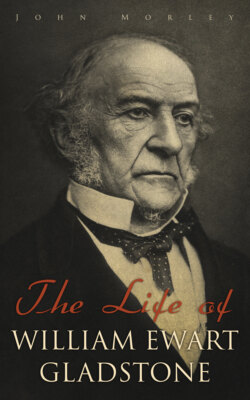Читать книгу The Life of William Ewart Gladstone - John Morley - Страница 67
На сайте Литреса книга снята с продажи.
FOOTNOTES:
Оглавление151. Undated fragment of letter to the Queen. See Appendix.
152. See above, p. 232.
153. Parker, ii. pp. 499, 529, 533.
154. Ibid., p. 509. Before the end of the session (Aug. 10, 1842) he had learned enough to do more justice to Hume and the committee.
155. The editor of Sir Robert Peel's papers was allowed to print three or four of Mr. Gladstone's letters to his chief at this interesting date. The reader will find the correspondence in Parker, ii. pp. 497-517, 519, 520.
156. In 1843 a bill was passed lowering the duty on Canadian corn imported into England, and Mr. Gladstone says in a memo, of 1851: 'In 1843 I pleaded strongly for the admission of all the colonies to the privilege then granted to Canada.'
157. Bright was elected for Durham in July 1843.
158. The question of the Welsh bishoprics was one of a certain magnitude in its day. The union of Bangor and St. Asaph had been provided for by parliament in 1836, with a view to form a new see at Manchester. The measure was passed with the general assent of the episcopal bench and the church at large. But sentiment soon changed, and a hostile cry was raised before the death of the Bishop of St. Asaph, when its provisions would come into force. On his death in 1846 the whig ministry gave way and the sees remained separate.
159. Mr. Gladstone to Lord Lyttelton, Dec. 30, 1845.
160. See above, p. 253.
161. Hansard, May 10, 1842.
162. Hansard, February 14, 1842.
163. The average price of wheat per quarter in 1841 was 64 shillings, in 1842, 57 shillings, and in 1843, 50 shillings, a lower average than for any year until 1849.
164. See Appendix.
165. See Speech, Aug. 10, 1843.
166. Wordsworth wrote (Oct. 15, 1844) to implore him to direct special attention to the desecrating project of a railway from Kendal to the head of Windermere, and enclosed a sonnet. The sixth line, by the way, is a variant from the version in the books: 'And must he too his old delights disown.'—Knight's Wordsworth (1896 edition), viii. 166.
